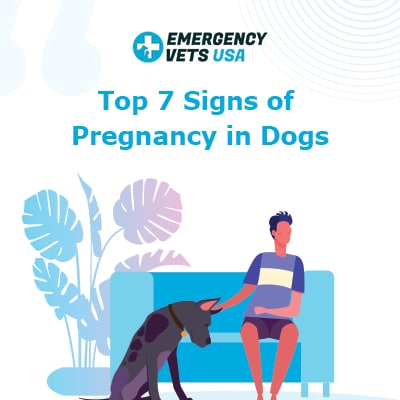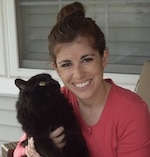Top 7 Signs of Pregnancy in Dogs
If you have a female dog that is not spayed, you will have to keep a close eye on her.
If she is let outside unsupervised for even a short period of time, there is a chance a non-neutered male dog may come around and get her pregnant.
Additionally, if she is allowed around other male dogs that are not neutered, they can easily notice when she is in heat and get her pregnant.
Of course, you may intend for your dog to get pregnant and are now waiting for any indication that she is.
In this article, we will discuss signs of pregnancy in dogs and what to watch out for.
When determining if she is pregnant, you will usually need to take a combination of these signs into consideration.
It is important to note that if you suspect your dog may be pregnant or that something is off with your dog, you should schedule an appointment with your vet.
They can help rule out other things that may be going on.
They can also discuss with you tests that can be done to confirm if she is pregnant or not.

What Are Dog Pregnancy Symptoms
Here are 7 signs your dog may be pregnant:
1.) Behavior Changes
Behavior changes are often early signs of dog pregnancy.
Pregnancy hormones can cause your dog to act different than their normal behavior.
Your dog may seek out more affection and want to be around you all of the time.
She may act more loving and nurturing as well.
Alternatively, your dog may actually prefer to be alone most of the time and avoid interactions that do not involve feedings.
2.) Appetite Changes
As the pregnancy progresses, your dog will likely be hungrier than usual, even without an increase in activity.
Pregnant dogs’ bodies are under a higher energy and nutritional demand.
Naturally, they will seek out more food and seem to be less full after their normal-sized meals.
3.) Decreased Activity
Pregnant dogs may have less energy and not be able to do their typical activities with you as well as before they were pregnant.
You may notice them sleeping more and being lazier throughout the day.
If this is an extreme change for your dog, you should schedule an appointment with your vet to make sure nothing more serious is going on.
4.) Darkened Nipples
Another thing you may notice during pregnancy in dogs is a change in color to their nipples.
The nipples may become a darker red and start to look bigger and rounder.
5.) Enlarged Mammary Glands
In addition to her nipples becoming bigger and darker in color, some dogs who are pregnant will have an enlargement in their mammary glands.
Oftentimes this happens after they give birth, but some dogs’ mammary glands will get bigger during pregnancy.
You may even notice some milk leaking from their nipples occasionally.
6.) Expanded Belly
The farther along in pregnancy your dog gets, the bigger her belly will grow.
Dogs are usually pregnant for about 63 days.
Your dog’s belly may not begin to look pregnant until she is a couple of weeks away from her due date.
If you have any reason to be concerned your dog may be sick, always take her into the vet.
There are other reasons for an expanded belly in dogs that are not related to pregnancy.
Just because your dog’s belly grows does not always mean she is pregnant.
7.) Nesting Behavior
Near the end of her pregnancy, your dog may start showing “nesting signs”.
This is where she begins look for a quiet, dark, comfortable place to have her puppies.
She may try to shed bedding material, and even seek solitude.
Caring For A Pregnant Dog
If you confirm your dog is pregnant, there are a few things you should do to help her stay healthy throughout the pregnancy.
Increased Feedings
Her nutritional and energy needs will be about 25% higher during pregnancy.
Keep her fed often, and mix in some puppy food with her regular food.
Once she delivers the puppies, she will need to be fed puppy food to help her body keep up with having to nurse all of her pups.
Watch out for a condition called Milk Fever.
Fresh Water
Keep plenty of fresh, easily accessible water available.
This is especially important if she is pregnant during the hot summer months and spends time outdoors.
Maintaining adequate hydration is very important for her health during the pregnancy period.
Veterinary Care
Have her examined by your veterinarian.
As mentioned before, this will help confirm the pregnancy and let you know how many puppies to expect.
Ideally she would have already had all of her necessary vaccines prior to becoming pregnant.
Unfortunately, pregnant dogs should not be vaccinated as it could harm the puppies.
Also, if you have any issues with fleas you need to get them under control now.
Ask your vet if there is a safe flea preventative medication you can give to your pregnant dog.
Fleas reproduce quickly and can drain a newborn puppy of their blood within 24 hours.
Preventing Pregnancy In Dogs
The best thing to do to avoid your female dog from becoming pregnant is to get her spayed.
As long as you spay her before she is 6 months old, you should not have anything to worry about.
If you cannot spay your dog and do not want her to be pregnant, you will need to keep her away from non-neutered male dogs.
This includes not allowing her any outside time unsupervised.
Male dogs can be quiet sneaky.
Pseudeopregnancy in Dogs
There is a condition in dogs called pseudopregnancy (false pregnancy), which is where their bodies think they are pregnant, but they actually are not.
They will develop all of the signs of pregnancy, including enlarged mammary glands and production of milk.
But they are not pregnant! It can definitely fool you.
The only way to know for sure is to take an x-ray of their belly to see if any puppies are present.
Again, this should be done after the 45th day of the suspected pregnancy.
Dogs can even have multiple false pregnancies in their lifetime.
You really just have to wait them out, for the milk production to slow down, and for your dog to get back to their normal selves.
It should not cause any problems for their overall health.

Leslie Brooks graduated from the University of Tennessee College of Veterinary Medicine in 2012. After graduation she moved to Indianapolis to do an intensive one-year internship at a specialty practice and then began working as a small animal general practitioner. She ran her own house call practice for three years, visiting pets in people’s homes. Currently, she works part time in clinical practice and volunteering her free time to serve pets of the homeless. Read more about us here.
